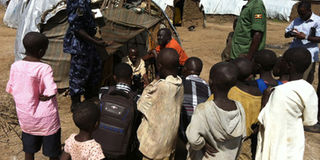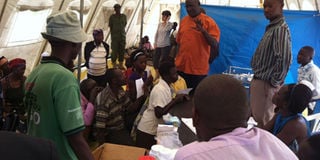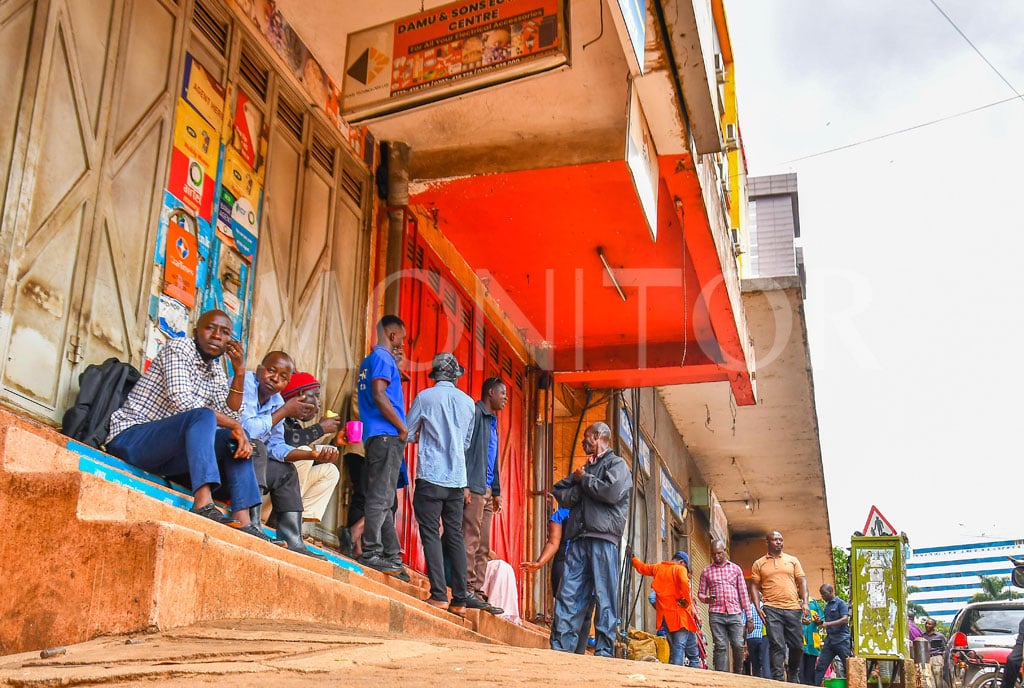Crisis looms as govt moves to close Sango Bay

Musa Ecweru, the Minister of State for Disaster Preparedness, talks to one of the inhabitants of Sango Bay Camp in Rakai District. Government plans to dismantle the camp, which was set up in 2013 as a temporary settlement for the immigrants Tanzania expelled. Majority of the immigrants had lived in the country for more than 30 years, but have their origin in Uganda, Rwanda and Burundi. PHOTO BY IVAN OKUDA
What you need to know:
On July 25, 2013, Tanzania’s President Jakaya Kikwete gave 35,000 irregular immigrants from Uganda, Rwanda and Burundi marching orders. Five thousand of these settled at Sango Bay Camp in Rakai District. Government now wants the camp dismantled but a humanitarian crisis looms, as Ivan Okuda writes
The sight of a toddler wiping sweat from a wrinkling body, wincing and hopelessly staring at empty dishes is saddening. To see its mother stare at it with dejection is even more heart-breaking. But to watch an elderly man pace aimlessly around his homestead with torn trousers and unwashed linen, an unshaven chin, each step his feet make depicting ire, is worse.
Petero Musinguzi , who is in his 70s, is one such effigy of the grim reality of camp life. He has five children but is as helpless and certainly hopeless as the child you find battling the bitter coldness on any African city.
“I have nowhere to go. I am a hardworking man but I cannot dig and provide food for my family because there is no free land in the camp,” he struggles to explain the despair his family is living in.
Once in a blue moon, they will get a cassava root or two for lunch. When the angels of luck smile, a handout from men and women with golden hearts will come down their homestead; homestead used here modestly for an otherwise makeshift shelter of a mud and wattle house with a tarpaulin for a roof, where the entire family crowds itself on a dump floor, at times having to cut short their sleep to scoop out water when the clouds let loose. Don’t ask what happens when mother and father receive nature’s conjugal call.
Welcome to Sango Bay Camp in the central district of Rakai, a place at least 5,000 people have called home since their expulsion from Tanzania two years ago. Their crime? In the eyes of Tanzanian authorities, they were illegal immigrants who had to be banished.
And banish them they did. The politics around their expulsion is a web of complex diplomatic relations with Uganda, Rwanda and Burundi and socio-political dynamics around Tanzania’s appreciation of the place of immigrants.
The minister of state for refugees and disaster preparedness, Musa Ecweru, revealed during a visit last week, he “wants to dismantle the camp soon. This was, from the start, a temporary camp but we faced some challenges and now we are ready to dismantle it.”
But the camp will not be dismantled by a mere edict of the minister. There is a whole chain of Cabinet and Parliament deliberating on the matter, and then there is the search for land for possible relocation and profiling of the residents of the camp.
As government bureaucrats burn the midnight candle over steaming coffee in air conditioned offices, deliberating on how and when to fix the misery of this lot, a humanitarian crisis looms.
On the day this newspaper accompanied the ministry officials alongside development partners on a visit to the camp, a meeting was called to, among others, break the news of the camp’s dismantling and engage its inhabitants on their plight. The stories are as telling as they are heart-wrenching.
Malaria, cholera in the corner

Minister Musa Ecweru talks to refugees at Sango Bay camp in Rakai District during a health centre visit to the camp
Sarah Kimerembe, a 27-year-old mother of two, spoke of how malaria claimed lives last year, around this time.
“Life here is hard, every day we stare death in the faces of our children when the rains come. Last year, we lost many babies, about 100, to malaria but Unicef donated nets which helped,” she told the meeting. And right here is the biggest challenge of the camp –good health.
Kakuto Health Centre, run under the Rakai district local government administration, last week held an outreach clinic at the camp. A tent was set up where the medical staff of the district attended to children with an assortment of ailments, tested adults for HIV/Aids and administered medication to those whose health was clearly turning troublesome.
This, the chief administrative officer says, “happens once in a while. I have written several letters to the Ministry of Health, asking for support but they have never responded nor increased drug allocation by even a tablet.”
For as long as the district cannot send this outreach to the camp a few miles from the district headquarters, a population of 5,000 people is subjected to the vagaries of life with no healthcare.
Uganda’s healthcare system and its “sickness” has been discussed over and over again, with a staggeringly low doctor: patient ratio at 1:24,725 against the World Health Organisation recommended ratio of 1:439.
For a country with a healthcare system largely described by analysts as being under intensive care, the jury is out there on the status of health for Sango Bay Camp where these outreach clinics come rarely.
“We really need to disassemble this camp at the earliest opportunity before the rains get worse lest we lose more children to malaria and I fear for cholera, typhoid outbreak,” Ecweru says.
His fear is founded on the squalid, if not inhumane accommodation status at the camp now. At the time of writing this story, a number of the mud and wattle houses had given way to rain, in others, the dwellers have to sleep in turns, with some family members scooping water out of the muddy floor, with a rag-tag mat and feather light blanket for beddings for families with an average membership of four.
Starvation hits

Here is the upsetting contrast of the two worlds we live in. On the day the team visited this camp, members had breakfast in Kampala. Along the way, some bought a bogoya (ripe yellow banana) or two, with a soda or water bottle, others gave in to the seductively appetising muchomo (roasted meat) paraded by menacingly persuasive sellers.
After the camp visit, there was a lunch buffet in Masaka District, again, with members eating to their fill. But here is what shatters the glass ceiling of human inequality.
By 1pm, the time of the tour, some members were complaining of hunger or at least, wanted to have a bite or drink. At the same time, in this camp where thirst connives with hunger against mankind, the camp dwellers stared at empty plastic plates and fireplaces. One child, possibly in his fifth year, moved minister Ecweru and his entourage.
He struggled his way through the mud and wattle house where it sat, with a spoon stuck in its sore filled mouth; with one hand it caressed a plate of water and peeled cassava and with another it scratched its rash-coated body.
As the minister interrogated him, he struggled to speak and broke down. An older sibling, also beaten by hunger, intervened, albeit with a strained voice. They had last eaten a week ago. Their parents were in the fields searching for food. Sometimes the search bears fruit, but often times, it does not.
In another homestead, again homestead used modestly for a setup of over 1,300 households, a teenage girl negotiated for sex with a conspicuously elderly man, the price going around Shs3,000, at least that is what a member of the team heard on eavesdropping. This could pass for any other place but not Rakai.
The district is infamous for the damage HIV/AIDS, in its nascent years in Uganda wrecked on the family institution. To this day, Rakai, in the minds of Ugandans, is the heartbeat of the deadly sexually transmitted disease.
That the camp dwellers, especially the teenagers have been reduced to sex objects, for no other reason other than the desperate search for bread leaves one speechless.
Humanitarian support not forthcoming
Last week, Unicef was loud and clear. It can no longer support the camp.
“We thought the camp was a stop gap measure but we are now tired, a permanent solution has to be found. The last time we supported the children’s makeshift school was December last year,” a senior Unicef official said. Already the humanitarian organization has folded its hands from the crisis in Sango Bay.
A tank it constructed for the dwellers to enhance access to safe water has since broken down and there seems to be no will to repair it. The 5,000 inhabitants now have to search for water out of their own creativity amidst scarcity.
The minister has since pleaded with Unicef to restore the tank, at least for the remaining duration of the camp’s life.
“Water is life. Cholera and typhoid can easily wipe out the camp if the water tank is not repaired,” Musa Ecweru said.
But who are these people?
Elias Byaruhanga, the chairman of the camp is in his 40s. His parents, he says, sold all they had and migrated from Kabale in south western Uganda to Tanzania. For his entire adult life, home was Karagwe, in Tanzania.
His parents have since passed on but he cannot trace his roots and even if he did, “I would have nowhere to settle with my family in Kabale because everyone has their garden.” Majority of Ugandans in the camp, he says, “are Banyankore and Bakiga from Isingiro and Kabale districts who migrated to Tanzania.
When we were expelled, the authorities took all our belongings so we came here like children, with nowhere to start from.” And then there are, among them, Rwandans and Burundians with a few Tanzanians.
“There is tension between Uganda and Tanzania over these people. Already some Burundians and Tanzanians have been sneaking into the camp, when we flash them out, they connive with some of our security officers and return,” Dennis Mbaine, the officer in charge of Mutukula police post says, adding, “When we share this with our counterparts in Tanzania, they say they don’t want to hear of these people.”
For non-Ugandans, Ecweru says, “they will have to return to their countries and those who feel insecure must seek asylum and be formally integrated as refugees and settled in refugee camps here. The government has a duty and will find land to resettle the Ugandans who have lost their family roots so they start a new life.”
This news mellows the hearts of the camp dwellers but when it is effected is a story for another day. For now, the inhabitants of Sango Bay wait for a sigh of relief. In the meantime, they hope Ecweru honours his pledge to send food to rescue the starving population which last received food rations from government in February.




